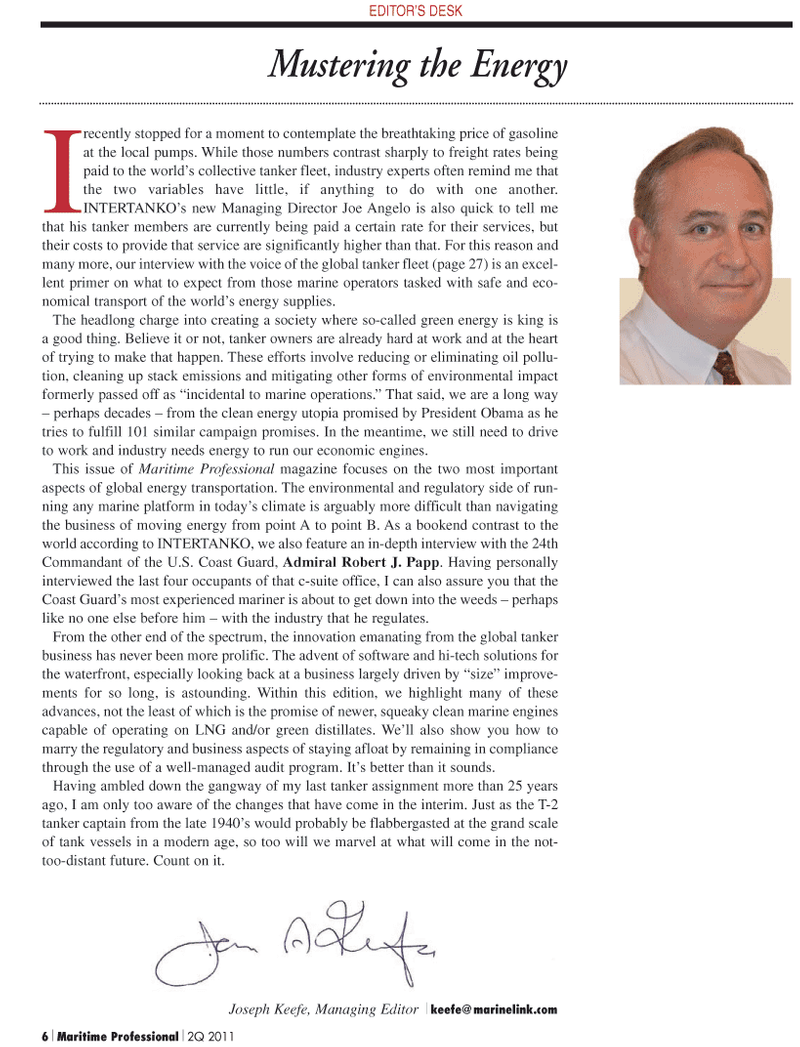
Page 6: of Maritime Logistics Professional Magazine (Q2 2011)
Energy Transportation
Read this page in Pdf, Flash or Html5 edition of Q2 2011 Maritime Logistics Professional Magazine
6 Maritime Professional 2Q 2011
Mustering the Energy
EDITOR’S DESK
I recently stopped for a moment to contemplate the breathtaking price of gasoline at the local pumps. While those numbers contrast sharply to freight rates being paid to the world’s collective tanker fleet, industry experts often remind me that the two variables have little, if anything to do with one another.
INTERTANKO’s new Managing Director Joe Angelo is also quick to tell me that his tanker members are currently being paid a certain rate for their services, but their costs to provide that service are significantly higher than that. For this reason and many more, our interview with the voice of the global tanker fleet (page 27) is an excel- lent primer on what to expect from those marine operators tasked with safe and eco- nomical transport of the world’s energy supplies.
The headlong charge into creating a society where so-called green energy is king is a good thing. Believe it or not, tanker owners are already hard at work and at the heart of trying to make that happen. These efforts involve reducing or eliminating oil pollu- tion, cleaning up stack emissions and mitigating other forms of environmental impact formerly passed off as “incidental to marine operations.” That said, we are a long way – perhaps decades – from the clean energy utopia promised by President Obama as he tries to fulfill 101 similar campaign promises. In the meantime, we still need to drive to work and industry needs energy to run our economic engines.
This issue of Maritime Professional magazine focuses on the two most important aspects of global energy transportation. The environmental and regulatory side of run- ning any marine platform in today’s climate is arguably more difficult than navigating the business of moving energy from point A to point B. As a bookend contrast to the world according to INTERTANKO, we also feature an in-depth interview with the 24th
Commandant of the U.S. Coast Guard, Admiral Robert J. Papp. Having personally interviewed the last four occupants of that c-suite office, I can also assure you that the
Coast Guard’s most experienced mariner is about to get down into the weeds – perhaps like no one else before him – with the industry that he regulates.
From the other end of the spectrum, the innovation emanating from the global tanker business has never been more prolific. The advent of software and hi-tech solutions for the waterfront, especially looking back at a business largely driven by “size” improve- ments for so long, is astounding. Within this edition, we highlight many of these advances, not the least of which is the promise of newer, squeaky clean marine engines capable of operating on LNG and/or green distillates. We’ll also show you how to marry the regulatory and business aspects of staying afloat by remaining in compliance through the use of a well-managed audit program. It’s better than it sounds.
Having ambled down the gangway of my last tanker assignment more than 25 years ago, I am only too aware of the changes that have come in the interim. Just as the T-2 tanker captain from the late 1940’s would probably be flabbergasted at the grand scale of tank vessels in a modern age, so too will we marvel at what will come in the not- too-distant future. Count on it.
Joseph Keefe, Managing Editor keefe@ marinelink.com

 5
5

 7
7
